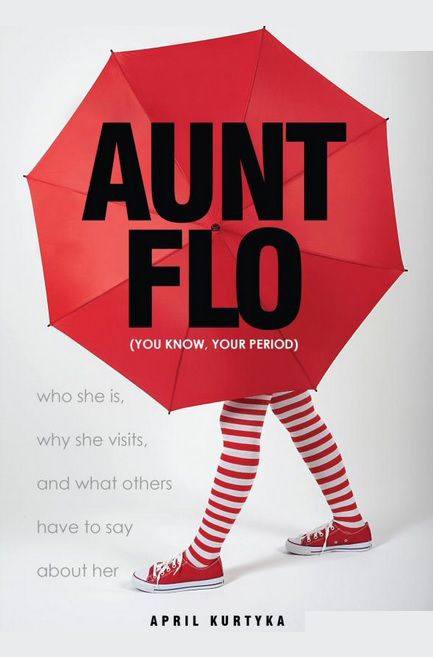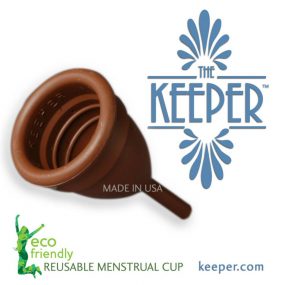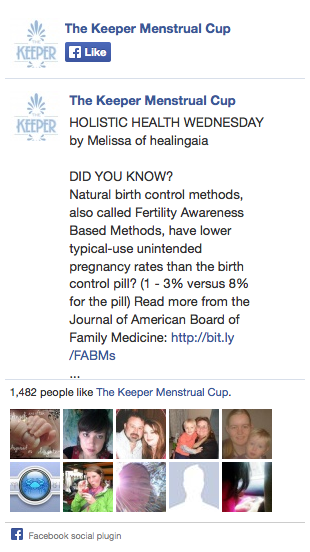Hi April, we are so excited to talk to you about your book Aunt Flo: Who She Is, Why She Visits, and What Others Have to Say About Her. Thank you for taking the time to chat with us. What inspired you to write Aunt Flo?
I was inspired to write a book about menstruation when my oldest daughter was about 12 years old. She and I would have discussions about periods, and I realized that not everyone had the open relationship that we had, so how would their questions be answered? I decided then that I wanted to write a book for my daughter and other girls her age so they could learn more about their body, and all of the different choices they have with menstrual products. They really just aren’t exposed to that information anymore.
How much of the book was a response to your own personal experiences?
I think more than anything I wanted to tell girls the facts about their body, but in a community-centered way. What I mean is I wanted them to hear it from more than just one person. I feel like that’s what I always wanted: to learn what other women were doing, what products they were using. I had my period for almost 15 years before I ever heard about alternative menstrual products. It wasn’t until I had a group of women around me that discussed menstruation in a loving and factual way that I learned so much more about myself. I wanted to try to recreate that with Aunt Flo.
You have a teenage daughter of your own. Did you try out some of the suggestions with her? How did she respond?
My daughter and I have a very open and honest relationship. She and I often have talks about our body and what we can do to nurture it best. I threw her a “red party” when she got her period for the first time and she absolutely loved it. She also uses many of the suggestions for period-related discomfort that are listed in the book; in fact, she is my model for the different positions that can help. What I learned by talking to her about everything is that she wants to know more, she wants to learn. So that makes me thankful that we are able to talk openly with each other.
How did you get in contact with the women and girls interviewed for the book? Was there anything they said which surprised you?
At the time I started gathering quotes for the book, I was working full time in the birthing business, so I had great access to a lot of women. I posted about it on my personal Facebook page, as well as the one I had at the time for my business. I was very surprised at how many women were excited to share their stories. I think women like to talk about it, they just don’t have a place where they feel comfortable to do so. I loved hearing from the women that were brought up to believe in their body and even celebrated their cycles—of course there were only a few of them, though. It was hard for me to hear all of the stories from the women who had a first period experience that was made to feel shameful or embarrassing. But that just gave me more motivation to get this book out there.
In the book, you provide prompts for journaling about your cycle. Why do you think journaling about health, and specifically menstruation, is important for women, especially young ones?
I love this question, because it’s so important to journal about menstruation. Our bodies are so incredibly wise; they give us so many clues as to what they need or how to take better care of them. The problem is, we are usually not listening. In my book I even suggest just writing one word a day about how you are feeling, because even if this little bit is all you can do, I bet you it will help. Your emotions cycle, too; you will start to see patterns in your moods, which will make you better able to expect them and work with them instead of against them. For example, if you have a time during the month of 1-2 days where you are more introverted, then you will know that you will not want to schedule a party or go out with friends at that time. It’s amazing how much better you feel when you honor your body’s signals instead of resisting and pushing against them. Also, it’s important to at least know when you start and end your period, for health reasons. As women—if you see a doctor—you know that one of the first questions they ask is about your periods, so make sure you know this information. There are so many apps out there now that can help you with this, and I think it makes it easier for young girls to know their body cycles.
What do you think about the current state of commercially available menstrual hygiene products? Do you have ones which you recommend to young women who may just be starting their journey into womanhood?
I feel like right now most of the commercially available products are a little scary. The FDA doesn’t require companies to list the ingredients of the products that we are putting near or inside the most porous parts of our body. That frightens me. I feel that history has proven that we have to wait until there are enough illnesses or deaths to have anyone take a look at a menstrual product, and then possibly take it off of the shelves.
Where I live I see a lot of girls battling with tampon usage. I live in a beach town, so no teenage girl wants to go to the beach with a pad on. There is a lot of pressure for them to use tampons, however there is little to no education about it. This is resulting in incorrect usage of tampons and even a few cases of TSS (toxic shock syndrome). This is a very real and very scary thing that needs more awareness.
I would suggest all girls start out with reusable pads, if it’s realistic for them. Inserting something into your vagina—whether it’s a cup or a tampon—should only be done once the girl has been educated about that product. If disposables are used, then unbleached and organic cotton is the way to go, in my opinion.
What is the one thing you think is most important for young women to take away from Aunt Flo?
I hope girls learn enough about their bodies to understand that they aren’t cursed and they shouldn’t be ashamed.
People around the world use euphemisms when discussing menstruation. You obviously have no issues discussing the matter frankly, so what went into the decision to title the book with a popular euphemism? Do you think that these ways of speaking indirectly about menstruation contribute to a fear of talking about it, or are they relatively harmless?
It’s funny, because I am actually a person that doesn’t like to beat around the bush when talking about the body. For my kids we’ve always used correct anatomical terms, like penis and vagina, instead of making up a cute name for them.
However, I have learned that sometimes it’s more important to get someone talking about a subject than worrying about what words they use for it (as long as they aren’t derogatory). I so badly wanted a teenage girl to pick up the book and immediately want to read it, this was so important to me. If I had named the book Your Period, or Menstruation, I don’t know if anyone would have picked it up. It’s unfortunate to admit that, but it’s the truth. For now, what is most important to me is getting it into the hands of girls that need it. Once that happens, maybe there will be more and more girls that are willing to talk about their periods openly.
You’re passionate about aiding women going through major life changes. Do you have any other insights into helping young women learn about their bodies and take care of their health?
I think it’s so crucial for us to listen to our bodies. What does your body tell you after you ate something? Did it feel energized? Or did you feel run down and sluggish? Notice how your headache goes away after drinking a glass of water. Honor your body when it’s asking to rest and be alone for today. I know you will feel better if you are able to just listen to your amazing body.
The Keeper Inc. is a small, woman-run company, and we love seeing other women become successful in their chosen careers. As a female entrepreneur yourself, what advice do you have for other women looking to start their own business or forge a career from their writing?
I have always been an entrepreneur and work with so many other women who are entrepreneurs as well. I think the biggest thing is to just do it. Is it scary? Yep! Is it hard work? Yep! But if you are passionate about something, don’t ever let anyone convince you not to do it. You matter and whatever you are passionate about matters. Honestly, when I first thought about writing this book, I thought it was crazy. Why would anyone write about book about periods—a subject no one even wants to talk about? But I did it because I was passionate about it. And I am so thankful that I did.
Is there a woman (or women) you looked up to when pursuing your business goals? Did you have a mentor or influential figure you looked up to when starting on the path you’ve followed to get to where you are?
This is a hard one for me. I don’t have any mentors really, but I have some people I adore, like Christiane Northrup and Doris Royster. The first one you’re probably familiar with since she’s a well-known and respected author and doctor. The second is my grandmother. She may not be as well known, but she is just as incredible. She has inspired me to be myself completely, without worrying about what anyone else has to say about it. She also inspired me to love and care for others as much as you possibly can. As a poor woman with 6 kids of her own, she took in close to 100 foster children throughout her life. She made a difference in the lives of so many, just by being herself. She doesn’t see anything special about what she did, but I do. And I hope to help at least as many people as she has.
Any final thoughts for us on any of the subjects we’ve touched on today? Anything you’d like to leave us thinking about?
I just encourage everyone to openly talk about menstruation. Sounds odd and uncomfortable to many people, I know. But the more we talk about periods in a shameful or embarrassing way, then the longer it will be treated that way. Think about it: perhaps just by talking about it you could encourage a young girl to have more confidence in herself, or inspire someone to take a stand for the inadequate amount of information we have regarding menstrual products. Just start talking.
Join The Keeper & The Moon Cup Newsletter. You will receive sustainable tips and special offers right in your inbox!
 Jennie Lyon is a green lifestyle writer and the owner of Sweet Greens, the award-winning green lifestyle blog. She posts on simple, fun ways families can go green together – starting with her own. When she isn’t blogging, you will find her paddleboarding, sailing, beach-combing, camping, or spending time with her amazing husband and 14-year old son
Jennie Lyon is a green lifestyle writer and the owner of Sweet Greens, the award-winning green lifestyle blog. She posts on simple, fun ways families can go green together – starting with her own. When she isn’t blogging, you will find her paddleboarding, sailing, beach-combing, camping, or spending time with her amazing husband and 14-year old son

















